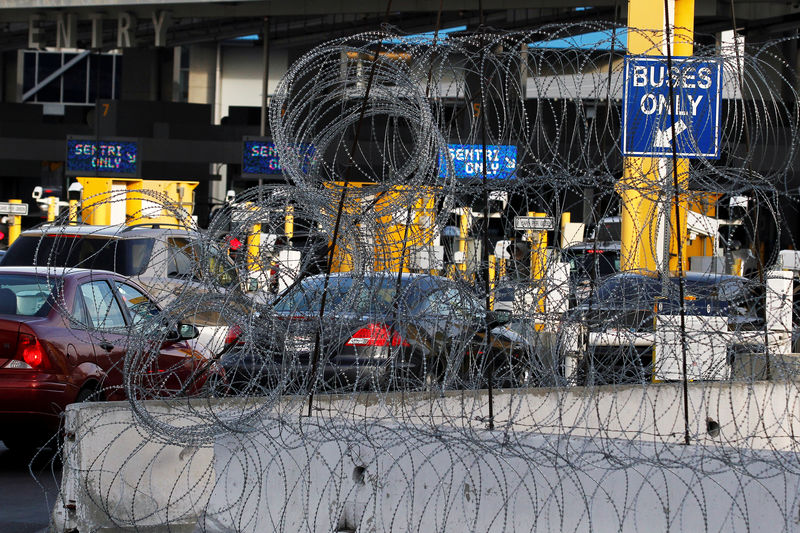By Yeganeh Torbati and Jose Gallego Espina
WASHINGTON/SAN DIEGO (Reuters) - The Trump administration is intensifying measures to curb the flow of Central American asylum seekers crossing into the United States from Mexico, officials said on Monday, including sending more people back to Mexico to wait for their asylum claims to be heard by U.S. courts.
Department of Homeland Security Secretary Kirstjen Nielsen said the U.S. Customs and Border Protection (CBP) agency will speed up the reassignment of 750 officers to parts of the border dealing with the largest numbers of immigrants, a shift the administration first announced last week.
U.S. President Donald Trump threatened to close the border this week if Mexico does not stop a surge of people, often traveling as families from Honduras, El Salvador and Guatemala. Closing the border would potentially disrupt millions of legal border crossings and billions of dollars in trade. His aides doubled down on the threat on Sunday but offered no specific details or timeline. (Graphic: https://tmsnrt.rs/2CJe9fh)
One policy put in place earlier this year to return asylum seekers to Mexico, called the Migrant Protection Protocols (MPP), will be "immediately" expanded by "hundreds of additional migrants per day above current rates," Nielsen said in a statement on Monday.
As of March 26, approximately 370 migrants had been returned to Mexico since the program began in late January, a Mexican official said last week.
People who have been returned to Mexico to wait are struggling to find attorneys and receive notice of their proceedings in U.S. courts, rights advocates said.
Trump administration officials say the MPP is a way to address the failings of the current system, which they claim encourages illegal immigration. Families that claim asylum are often released into the United States because of limits on how long children can be held in detention, allowing them to stay for years while their cases move through a backlogged immigration court system even though many claims are ultimately denied.
SHELTERS AT CAPACITY
The administration is hoping policies of deterrence will reduce the number of people who turn themselves in to U.S. border agents, overwhelming the capacity of processing centers along the southern border.
CBP estimated last month that some 100,000 migrants would be apprehended or encountered at the border in March, the highest level in a decade, forcing agents to temporarily house migrants for processing in an outdoor enclosure under an international bridge in El Paso, Texas. That overflow site was shut down on Sunday after being used for a month.
The total number of immigrants being released by U.S. immigration authorities in El Paso is averaging 500-600 per day, said Ruben Garcia, executive director of Annunciation House, which coordinates migrant releases with U.S. immigration authorities. Annunciation House is preparing for that total to rise to up to 1,100 during the current surge, Garcia said.
Mexican President Andres Manuel Lopez Obrador said on Monday that Mexico will help to regulate the flow of Central Americans passing through its territory to the United States. He said the root causes behind the phenomenon must be tackled.
In a move Democrats and Republicans in Congress have said would be counterproductive, the U.S. State Department cut aid to Guatemala, Honduras and El Salvador after Trump accused them, without providing evidence, of having "set up" migrant caravans and sending them north.
The Mexican government did not respond to requests for comment about the expansion of MPP, and it was not clear to what extent Mexico was forewarned. In the past, Mexico has said it was accepting returned asylum seekers for humanitarian reasons although it opposes the policy.
Shelters in major Mexican border cities such as Tijuana and Ciudad Juarez are already at capacity because of the increase in asylum seekers in recent months and the U.S. policy of only allowing a few dozen people per day to ask for asylum at ports of entry.
COURT HEARINGS
Last week, San Diego immigration judge Scott Simpson heard from the first Central American families that were returned to Mexico under the MPP policy.
Of four families in court on Wednesday, just one had an attorney.
Yanira Esmeralda Chavez, a Salvadoran fruit seller, accompanied by her three boys did not have a lawyer as she made her case to Simpson. The family had been staying at a shelter in the Mexican border city of Tijuana, and asked to remain in the United States because they feared being sent back to Mexico.
"I called the numbers on the attorney list that they provided me, but they said they cannot take my case because I am in Tijuana," Chavez said in the hearing. "It would be better if I stay in the U.S., where I have family members."
Simpson gave Chavez two more months to obtain an attorney, and said that her family in the United States could perhaps help her find a lawyer.

Throughout the day, Simpson expressed his concerns about the policy, saying he was "skeptical" about migrants getting their notices to appear in court, given the court does not have proper addresses for those returned to Mexico.